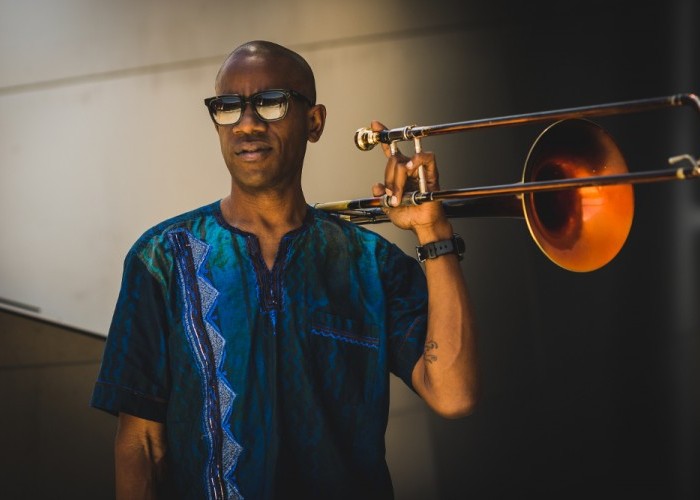Jan 13, 2026 2:09 PM
More Trump-Kennedy Center Cancellations
The fallout from the renaming of the John F. Kennedy Center for the Performing Arts to include President Donald…

Ryan Porter is a member of the West Coast Get Down.
(Photo: Courtesy of the Artist)Late 2008 was a memorable time in the life of trombonist Ryan Porter.
Barack Obama had just won the presidential election, and Porter’s group, the West Coast Get Down, was hitting its stride. The possibilities, both personal and universal, felt endless.
“There was something about the energy and the optimism of that time,” said the 38-year-old Los Angeles native, looking back on the time nearly a decade later. It’s why he decided to call his latest album, recorded in those heady days, The Optimist—and why, after thinking for years about re-recording those early sessions, he ultimately decided against it.
“It wasn’t [done in] a fancy recording studio, so it was a very, very honest recording,” he said of the album, which he described as a snapshot of a time when “we really wanted to be great musicians, and we needed each other to attain that dream.”
The Optimist (World Galaxy/Alpha Pup) was recorded in a garage nicknamed “The Shack” that belongs to the father of Kamasi Washington, West Coast Get Down’s saxophonist. It was a great practice space, but not ideal for recording because it was directly below a flight path for the LAX airport. For each take, the group would have to seal up all the doors and windows, and sweat it out together, five or six musicians and a couple of recording engineers, in a space barely big enough for three.
Despite the conditions, The Optimist is a tight, lively set, capturing a group of young players finding their swagger three years before the marathon recording session that would yield Kamasi Washington’s The Epic (Brainfeeder). Porter’s infectious compositions, which combine elements of hard-bop and soul-jazz with rhythms inspired by funk and hip-hop, provide a framework in which every player gets a chance to shine—especially Washington, whose powerful, Sonny Rollins-like sound graces every track and shadows Porter on the album’s memorable melodic themes.
“He’s my favorite musician to play a melody with,” Washington said of Porter. “His tone, there’s so much in there, it’s actually hard to mic. He has one of the thickest, richest tones I’ve ever heard.”
Many members of the West Coast Get Down are second-generation musicians, but Porter is not one of them. His love of jazz came from his grandfather, an auto mechanic with a vast record collection, who would let a young Porter help out in his repair shop. “I was his assistant,” Porter recalled. “And that meant not only do I get to handle the tools, but I get to be the DJ after his hands get dirty.”
Porter studied at the Manhattan School of Music under bass trombonist David Taylor and trombonist Steve Turre, both of whom he counts, along with J.J. Johnson, as major influences. Though he was grateful for his time in the New York jazz scene, Porter never doubted that he would return to L.A. to rejoin his West Coast Get Down bandmates, many of whom had been playing together since middle school.
“In New York, it was a lot more jazz musicians who only wanted to play jazz,” Porter said. By contrast, his early mentors included drummer Billy Higgins and trombonist George Bohanon—who, like many successful L.A. musicians, did session work in a variety of styles and genres. “That was what the community of teachers there in L.A. taught us: not to make it just jazz.”
Porter continues to find inspiration in unlikely places. His 2017 debut album was a set of children’s songs, reimagined as soulful jazz standards, called Spangle-Lang Lane (World Galaxy/Alpha Pup), for which his two young daughters served as both muses and critics.
“I would put it on,” he said, chuckling, “and if they found something else to do, I knew I had to go back to the drawing board.” DB

Belá Fleck during an interview with Fredrika Whitfield on CNN.
Jan 13, 2026 2:09 PM
The fallout from the renaming of the John F. Kennedy Center for the Performing Arts to include President Donald…

Peplowski first came to prominence in legacy swing bands, including the final iteration of the Benny Goodman Orchestra, before beginning a solo career in the late 1980s.
Feb 3, 2026 12:10 AM
Ken Peplowski, a clarinetist and tenor saxophonist who straddled the worlds of traditional and modern jazz, died Feb. 2…

The success of Oregon’s first album, 1971’s Music Of Another Present Era, allowed Towner to establish a solo career.
Jan 19, 2026 5:02 PM
Ralph Towner, a guitarist and composer who blended multiple genres, including jazz — and throughout them all remained…

Rico’s Anti-Microbial Instrument Swab
Jan 19, 2026 2:48 PM
With this year’s NAMM Show right around the corner, we can look forward to plenty of new and innovative instruments…

Richie Beirach was particularly renowned for his approach to chromatic harmony, which he used to improvise reharmonizations of originals and standards.
Jan 27, 2026 11:19 AM
Richie Beirach, a pianist and composer who channeled a knowledge of modern classical music into his jazz practice,…